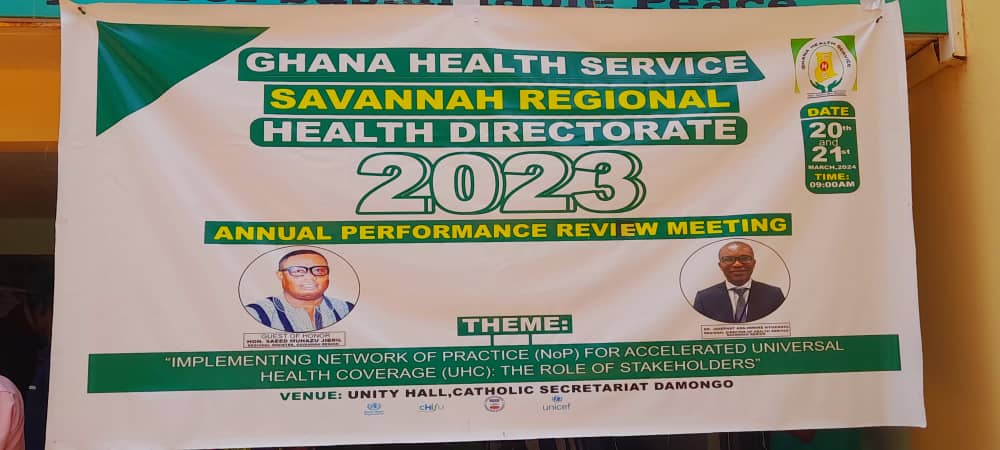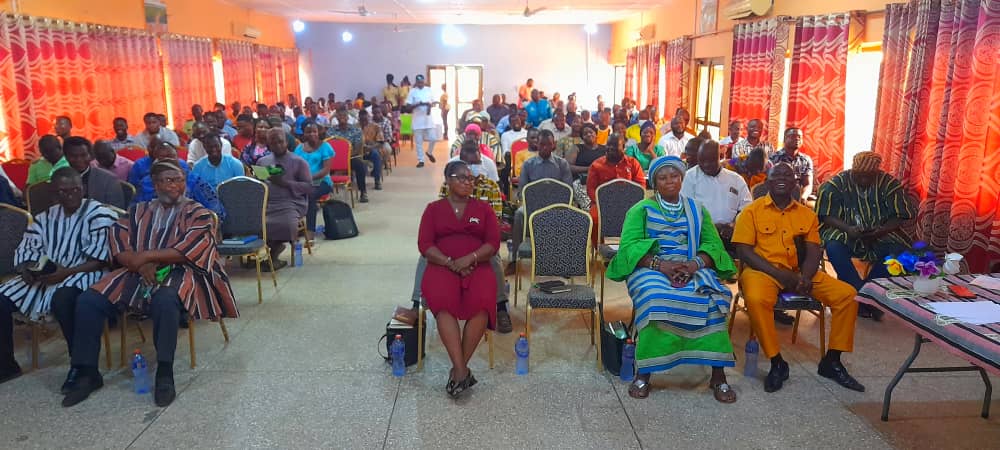The Savannah Regional health services has divulged mixed performance in some service delivery indicators for the year 2023.
This was disclosed at the 2023 annual performance review meeting held on Wednesday, 20th March, 2024 at Damongo.
The annual review meeting emphasizes the importance of implementing the Network of Practice (NoP) to accelerate Universal Health Coverage (UHC). The initiative aims to enhance access to quality healthcare services in achieving UHC by 2030.

Despite improvements in key health indicators, challenges like poor referral systems persist. The NoP initiative shows promise in addressing these barriers by improving coordination, accessibility, and resource utilization in primary healthcare (PHC) delivery.
It involves collaboration among various stakeholders, including health providers, faith-based organizations, and government agencies. The initiative seeks to provide comprehensive, patient-centered care for common health conditions to strengthen the health system.
Addressing key stakeholders at day-one of the 2023 Annual performance review meeting, Dr. Josephat Ana_lmwine Nyuzaghl, the Director of Health Services for the Savannah region, unveiled a comprehensive assessment of service delivery indicators for the year 2023. The report highlighted both notable achievements and areas requiring urgent attention.

According to Dr. Nyuzaghl, the overall performance score for the region stood at 3.5 out of 5, indicating a moderate level of performance across the 92 assessed indicators and 3 milestones. While this represented a slight decline from the previous year’s score of 3.6, it underscored the need for continued efforts to elevate the region to a highly performing status.
He indicated that one significant improvement was observed in maternal health, with a reduction in institutional maternal mortality ratio from 78 to 62 per 100,000 live births, accompanied by enhancements in skilled delivery attendance and a decrease in stillbirth rates.


He explained that strides were made in combating tuberculosis (TB) and HIV/AIDS, with increased TB notification rates and notable progress towards global targets for HIV/AIDS testing, treatment and viral load suppression.
Dr. Nyuzaghl further explained that routine immunization coverage also saw improvements, albeit with some fluctuations in specific vaccine coverage rates. Adding that, the region demonstrated effective surveillance and response mechanisms for vaccine-preventable diseases such as meningitis, yellow fever, and measles.

The Regional Director for health services also disclosed that certain challenges persisted, including a rise in malaria incidence, a decline in family planning acceptance rates, and an increase in institutional neonatal mortality rates. Noting that the prevalence of anemia among pregnant women raised concerns about maternal and newborn health outcomes.
The region according to him, also faced setbacks in the functionality of Community-Based Health Planning and Services (CHPS) zones, attributed to attrition of Community Health Officers (CHOs) and inadequate funding for training replacements.
Addressing the rise in non-communicable diseases (NCDs), particularly diabetes and hypertension, emerged as a priority, necessitating improved screening and awareness campaigns to promote early detection and intervention.

On a positive note, the Savannah Region Health Directorate received support in the form of vehicles, motorbikes, and infrastructure development projects, including a vaccine cold room and Comprehensive Abortion Care (CAC) sites.
Looking ahead, Dr. Nyuzaghl emphasized the importance of concerted efforts from all stakeholders to build on achievements, address challenges, and propel the region towards higher levels of healthcare delivery excellence. Efforts to strengthen healthcare infrastructure, human resources, and disease surveillance systems will be crucial in achieving these goals, he said.
Source: Padfm.com.gh/Kumatey Gorden/0243531604

















